Napoleon III, First President and Last Emperor of France
Modern western education has a lot of biases built into it, including a basic assumption that democracy is the most natural form of government. This fails to properly teach people how fragile democracy as a system can be, and how dependent it is on people’s willingness to abide by its rules. It took only fifty years from the Roman general Pompey’s contemptuous declaration of “Stop quoting laws, we have swords” to the fall of the Roman Republic and the end of five hundred years of democracy. Two thousand years later, it took even less time for the Second French Republic to fall to the greed for power of the man who became Emperor Napoleon III.
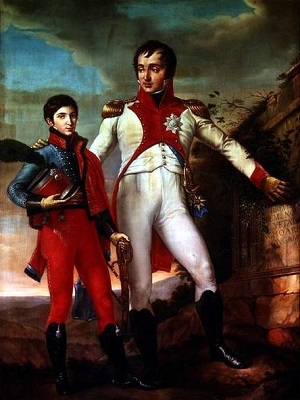
Charles-Louis Napoleon Bonaparte was born effectively just because his uncle Emperor Napoleon Bonaparte wanted an imperial heir. Napoleon’s wife Josephine and he had failed to have any children, though he had illegitimate children from his mistresses and she had children from a previous marriage. One of those children was a daughter named Hortense, and the emperor decided to arrange a marriage between her and his younger brother Louis. Though both of them had been born commoners, in 1802 they found themselves pushed into a dynastic marriage designed to produce an heir of Josephine and Napoleon’s blood.
It wasn’t a happy marriage, unsurprisingly. Hortense had been bullied into the marriage by her mother, and she wasn’t thrilled to be marrying a man she barely knew. Louis, on the other hand, suffered from depression and found his serious temperament at odds with the bon vivant Hortense. Still, the marriage fulfilled its purpose when she had two sons in the first two years. Further strain to the marriage came in 1806 when Louis was made King of Holland by his brother. Hortense tried to persuade the emperor to let her stay in Paris (with the social life she enjoyed), but he was adamant and so she accompanied her husband to The Hague.
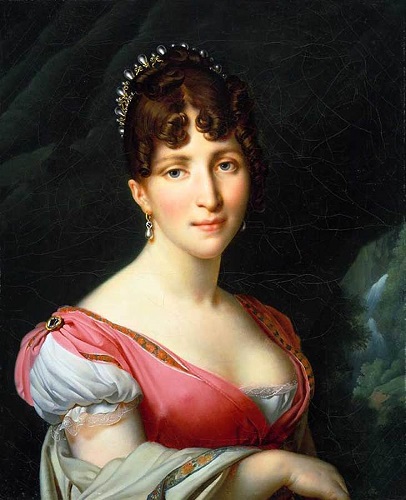
Hortense liked Holland more than she expected, which surprised her. She herself was also popular with the people of Holland, which annoyed her less popular husband. That isn’t to say that she was happy there, though. She missed Paris desperately, and grew to despise her husband Louis. In 1807 their eldest child (Napoleon Louis Charles) died, and they decided despite their effective separation to have one more child together. That child was Charles-Louis Napoleon Bonaparte, the future Napoleon III, and he was born in April of 1808.
Hortense had managed to convince Emperor Napoleon to let her stay in Paris for the good of her children’s health, but in 1810 Napoleon was persuaded by his advisers to divorce Hortense’s mother Josephine (who he still loved very much) and marry an Austrian princess both to secure an alliance and to produce a direct heir. In order to avoid the awkwardness of his new wife meeting her at court, Hortense was sent (under protest) back to Holland.
In the meantime though Louis and Napoleon had fought over the position of Holland within the Empire. Louis genuinely supported his new kingdom, but when he defied the Emperor he was forced to abdicate. This meant that Hortense was no longer bound by the conventions of royal norms, and she was able to separate from Louis. Divorce was out of the question, of course, but their marriage was now properly over. (A year later Hortense had an illegitimate child by her lover, the Comte de Flahuat, though this was all kept secret at the time.)
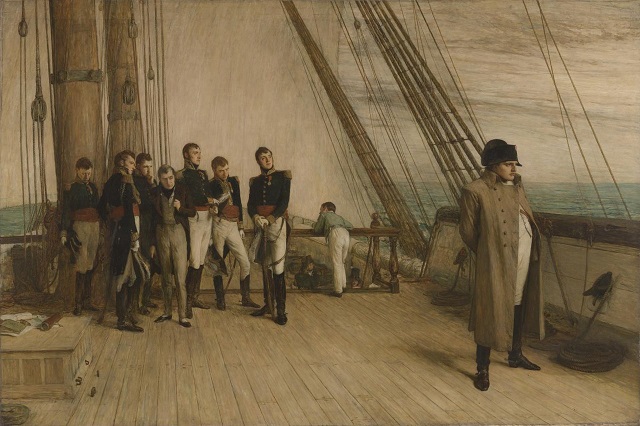
The life of the young Charles-Louis was irreversibly changed when he was seven years old. Before that he had been the fourth in line to the imperial French throne; after his cousin, his father and his brother. But then came the defeat of his uncle Napoleon at Waterloo. This led to the fall of the French Empire and the restoration of the old monarchy. Hortense was initially put under the protection of the Russian Empire and given a new French title, but when she supported her stepfather/brother-in-law during his attempted return to power she was banished from France. As a result Hortense fled first to Germany, and then to Switzerland. This was where Charles-Louis (now known commonly as “Louis”) was educated until he was fifteen years old, giving him a German accent that stayed with him throughout his life.
When Louis was fifteen his mother Hortense moved to Rome, and Louis went with her. At the time Louis’ elder Napoleon-Louis was nineteen, and he joined them in Rome. The two brothers soon became inseperable. They were young and rich, and the Bonaparte name lent them a notoriety that they used to its full effect in wooing the young ladies of Rome. The Bonaparte name impacted them in other ways, however. Their uncle Napoleon (who had died in 1821) had specified in his will that the children of his siblings should marry each other to preserve the family fortune, so it was decided that Napoleon-Louis should marry his cousin Charlotte. He was reluctant to do so, but was eventually persuaded to go along. They were married in Florence in 1826.
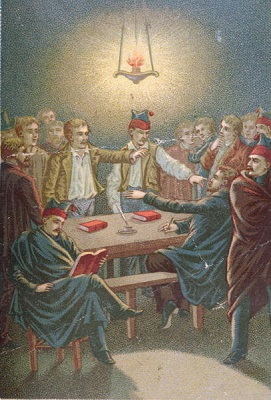
The two brothers remained close, with Napoleon-Louis and his wife spending time with her father in Florence and his mother in Rome. They fell in with the faction seeking Italian independence from the Austrian Empire, and joined the secret society called the Carbonari. This was an underground group covertly organising resistance to the Austrian occupation. The July Revolution that took place in France in 1830 (toppling the Bourbon king and replacing him with his more liberal cousin) triggered a similar revolution in Italy, which the brothers took part in. In 1831 this revolution was crushed by Austrian troops pouring in from the north. The brothers fled, but Napoleon-Louis fell ill on the road. Officially he died of measles, though there were rumours that he died from a bullet wound. Either way he was dead.
Louis was joined in hiding by his mother Hortense. They had little time to grieve for Napoleon-Louis, as Louis was being hunted by the Austrian forces. They managed to escape to France, where they took refuge in Paris. Officially they were both exiles, so Hortense petitioned the new king, Louis-Philippe, to allow them to stay. Louis also asked to join the French army as an “ordinary soldier”. The king was smart enough to realise that no Bonaparte would be an ordinary soldier, so he said that Louis would have to change his name. Louis refused. Despite that the king still allowed them to stay in Paris; as long as their stay was “brief and anonymous”.
Though it had been over fifteen years since the end of the Empire, there were still plenty in Paris who regarded it as a lost golden age when France had held the reins of European power. Some (the Bonapartists) sought to return the heirs of Napoleon to power, others simply wished to rehabilitate his reputation. Either way they found out that Hortense and Louis were staying in a hotel on the Place Vendôme, and on the tenth anniversary of Napoleon’s death they staged their commemoration outside it. That violated the “anonymous” part of their deal with the King, so he made them leave the country. But it also woke something up inside Louis, an idea that the people of France wanted nothing more than for him to reclaim his uncle’s throne.
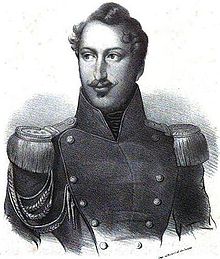
Louis and Hortense found refuge in London, a city which Louis found somewhat to his liking. However they still had family possessions in Switzerland so that was where Hortense went; and Louis decided to follow her. With his ambitions awakened he decided to deliberately follow in his uncle’s footsteps by entering the military. (This involved him gaining Swiss citizenship, which he was grateful for later.) Napoleon had been an artillery officer, and though Louis was an infantry captain he evoked this by writing a manual of how to use artillery. (He also invented a new type of cannon, which he tested by firing out of the windows of his mother’s house.) His mentor was Guillame Henri Dufour, a Swiss general who had served in the French army under Napoleon. It’s not surprising then that he wrote another book, “Rêveries politiques” (”Political Dreams”) where he laid out his vision of the future.
October of 1836 was when Louis-Napoleon Bonaparte first attempted to make that vision a reality. He decided to model his plan on the return of Napoleon from Elba, the “100 Days” where he had won the armies over to his side and briefly managed to retake power. Louis targeted Strasbourg as the starting point for his campaign for two main reasons. One, he knew the soldiers there were discontented and likely to rally to his side. (He had already been in contact with a colonel there.) Secondly, it was close to the Swiss border. This would turn out to be a good idea.
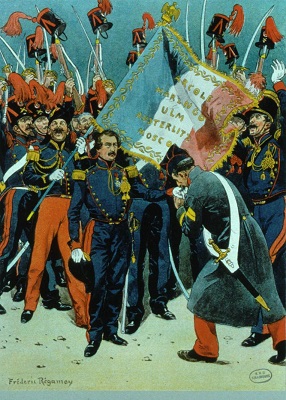
Initially things went well. The men loudly declared for Louis, and it looked like the coup was on. Unfortunately they made one key mistake, allowing news of events to leave the city. The city was soon surrounded by the French army and the garrison surrendered. Louis managed to flee the city and make it back to France. The army pursued him, and demanded the Swiss government extradite him. They refused (because he was a Swiss citizen), but when it looked like this might lead to war between the Swiss and the French Louis voluntarily left the country and headed for the traditional sanctuary of rebellious Europeans: America.
Though this first attempt at a coup might seem like an embarrassing failure, it did have some key successes. Firstly, the men had declared for Napoleon and (after they were all acquitted of mutiny) they were treated as heroes. Secondly, it officially put Louis in the position of heir-apparent to the Imperial throne. (He wasn’t actually Napoleon’s heir, as his father was still alive. But Louis senior had no interest in pursuing the throne.) As such it’s not surprising that it didn’t put an end to his ambitions. What did put those ambitions on hold was news which reached him in America. Hortense, his mother, was dying.
At the time Hortense was in her chateau in Switzerland, but when Louis tried to obtain papers to travel there from London he was blocked by the influence of King Louis-Phillipe. Louis was forced to buy a forged American passport in order to get to Switzerland in the August of 1837. Two months later Hortense died. She had wanted to be buried next to her mother Josephine, and this was finally arranged in January of 1838. Given the potential for this to be a flashpoint of Bonapartism, Louis was not allowed to attend the funeral. In fact, Switzerland once again came under pressure to extradite him to France; and so he voluntarily left and headed to London.
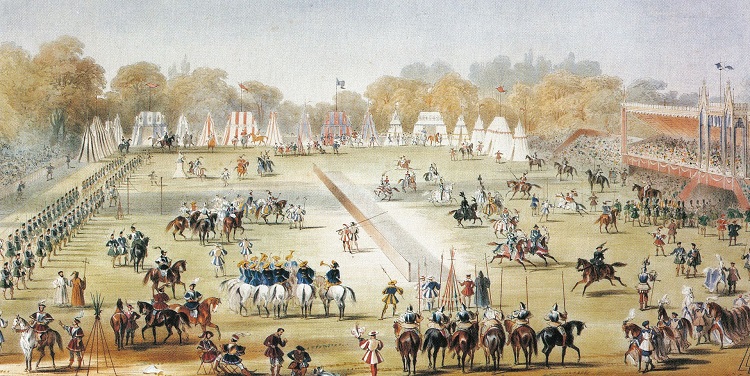
This time Louis stayed in London, where he became somewhat of a celebrity. He had inherited his mother’s not inconsiderable fortune on her death, which was enough for him to establish a lavish household in London. He became friends with Disraeli and Edward Bulwer-Lytton, and the reputation of his cook soon made invitations to dinner at his house much sought after. In August of 1839 he was one of the “knights” who took part in the “Eglinton Tournament”, a massive recreation of a medieval joust that took place in Ayrshire, Scotland. Other participants included nobility and politicians, and as well as enhancing Louis’ reputation this event was a valuable source of connections.
Because Louis still had his ambitions. His carriage bore an imperial eagle on the doors, and the British newspapers began referring to him as “Napoleon III”. (”Napoleon II” had been his cousin, the son of Napoleon and his second wife, who had died of tuberculosis in 1832.) In a more concrete move, Louis secretly financed a Bonapartist newspaper in Paris as well as several clubs. He also had a pamphlet, Des idées napoloniennes, printed detailing his plan for government and lionising his uncle. With that it wasn’t surprising that he tried once again in 1840 to trigger an overthrow of the French government.
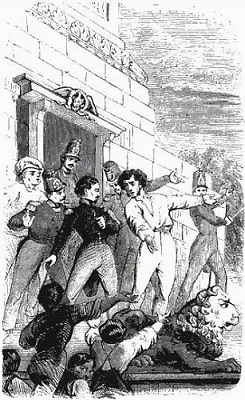
Louis’ plan this time was similar to his last one. Approach a French garrison (Boulogne this time), incite them to rebel, and snowball that into victory. This time he was accompanied by a group of mercenaries, on board the Edinburgh Castle. Unfortunately unlike last time he had no ally inside the garrison to make sure the troops were amenable and sway them to his side. The soldiers laughed at him before attacking him and his mercenaries. One of them was killed, and Louis himself was captured. Both the French and the English papers mocked him as mad, something which may have saved him from execution. As one newspaper said: “One doesn’t kill crazy people. One just locks them up.” So that was what they did.
Louis Napoleon Bonaparte was held prisoner in the Château de Ham, a medieval fortress turned prison in northern France. Though he was a prisoner, he was a rich one. This meant that his conditions were far from uncomfortable. He had his own suite of rooms with a fireplace, and he was free to order in not only order in whatever books he wanted but also to take a mistress. Her name was Éléonore Vergeot, and she was originally a maid in the prison. She bore him two sons during his time at what he later called “the University of Ham”.
Confined to his rooms Louis let his imagination roam, reading books on politics and statecraft as well as writing a great deal. His articles were published in newspapers and magazines all over France, helping to build him a reputation as a “friend to the common man”. He also wrote books, the most famous of which is L’extinction du pauperism. This book combined a study of the causes of inequality in French society with proposals to resolve it, based both on proto-socialist doctrine and on credit-based capitalist ideas. It proved extremely popular, and did a lot to establish the idea that Louis Napoleon Bonaparte was more than the “crazy man” the newspapers labeled him as.
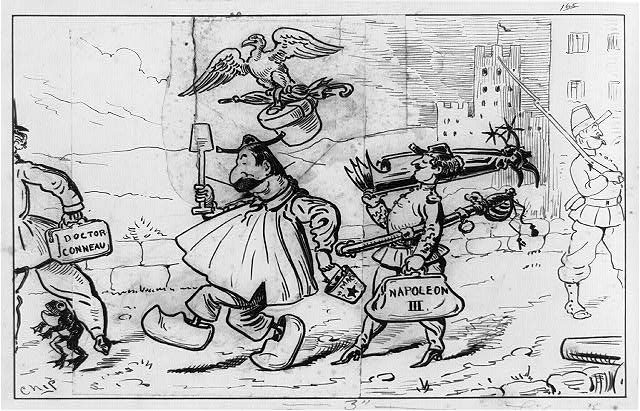
Though his prison was comfortable, it was still a prison and Louis knew that if he wanted a chance to put his theory into practice he needed to get out. One of the men imprisoned alongside him was Doctor Henri Conneau, a friend of his family who had been his mother’s private doctor during her final illness. Henri was not so closely watched as Louis, so he was able to steal a workman’s uniform for him. Louis shaved off his distinctive moustache, put on the uniform, hoisted a load onto his shoulder (conveniently hiding his face) and then just walked out the front gate. By the time they realised he was gone he had already made it over the border to Belgium. A day later he was back in London.
Louis soon resumed his social whirl in London and this was when he met one of his most famous mistresses, an actress named Harriet Howard. That was her stage name (she had been born Elizabeth Ann Harryet) but after eight years of acting she had made it her own. She was twenty three years old (Louis was thirty seven), and she was (thanks to her huge success as an actress) very rich. She wasn’t Louis’ only mistress in London (he also had a brief fling with the French actress Rachel Felix while she was on tour there, for example) but she was the most serious one. Serious enough to take in his two children from Ham and foster them alongside her own son (born from an earlier relationship). And serious enough start throwing her money behind his ambitions.
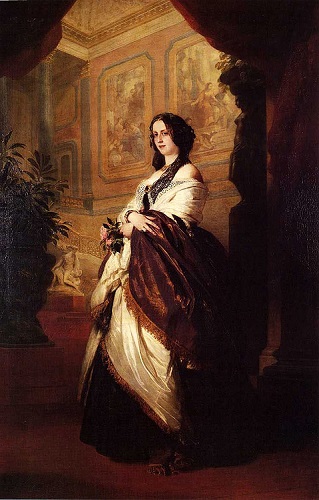
That money came in extremely handy in 1848, when Louis realised there was a new path opening up for him. The fact that the vote in France was restricted to male landholders (about 1% of the population) caused more and more tension over time. The representatives elected by these landholders were either unaware or uncaring of the effects that the recession affecting the French economy were having on the working classes. When the government attempted to crack down on those agitating for electoral reform, it was the final straw. A revolution broke out in February of 1848, one which within days led to the collapse of the government, the abdication of the King and the establishment of the Second Republic. Clearly the nation was ready for a hero, a Bonaparte. It was time, Louis decided, to go home.
It’s fair to say that the Second Republic didn’t get off to the best start. One of the main problems was that the revolution had been driven by radical socialist impulses, but the men who wound up holding the reins of power were liberal centrists who had no desire for massive changes to the social order. One change they could not resist was giving the vote to every (male) French citizen, vastly expanding the electorate. A swift election meant a weak and disunited Assembly though, which allowed the ultra-conservative Party of Order to seize power in a second set of elections at the start of June. This triggered a new revolution (the “June Days”) that was brutally crushed by the French army. That set the stage for the Presidential Election in December of 1848.
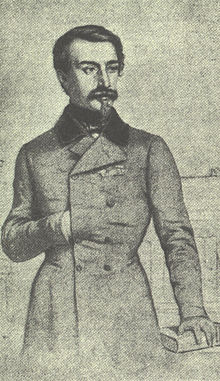
The election was held under a constitution written by the Party of Order, and the terms seemed set out specifically to favour them. Unless a candidate achieved an outright majority (over 50%) in the popular vote, then the Assembly (controlled by the Party of Order) would elect the president from among the candidates. Their candidate was Louis-Eugène Cavaignac, the general who had commanded the army that crushed the June Days rebellion. Since that time he had effectively been leader of the country, and his party saw the election as simply formalising what was already a fact. It wouldn’t turn out that way, of course.
Louis had put his name on the ballot in multiple districts in the June elections, and won four of them. At the time he was still officially exiled from France, but he wrote to the government and convinced them that a Napoleon in France participating in politics was better than one abroad being held up as a symbol of rebellion. He was elected to the assembly again in the September elections, and this time he was able to return to Paris and take his seat. This was a remarkable turnaround for a man who three years before had been a prisoner and the subject of public ridicule.
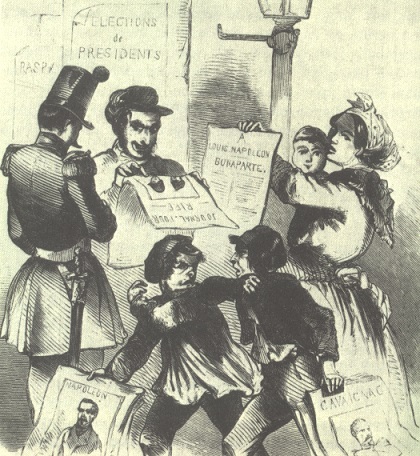
Louis had one major advantage over his political rivals: he had been in London in June. This meant that he could not be blamed either for starting the revolution or for brutally crushing it. He had two other major advantages, of course. The first was the Bonaparte name, which had by now become a byword for a better age. Second was the sizable fortune of Miss Harriet Howard, who threw her full backing behind him. The fact that he wasn’t affiliated with any political party allowed him to be “all things to all men”. To the socialists he was a socialist: just look at his books! To the conservatives, he was a conservative: just look at his uncle! This allowed him to build a frankly contradictory of coalition of support, which led to him winning the election with an astounding 74.3% of the vote.
Louis Napoleon Bonaparte was now President of the Second French Republic. Even though Cavaignac and his clique had been sure that he would be swept in a President their constitution still limited the President’s power by the Assembly. They were determined not to repeat the mistakes of the First French Republic, and as a result would make exciting new mistakes of their own. The first of those was arguably after the election, when Louis asked Adolphe Thiers (head of the Party of Order) to form a government. Thiers, who had been a minister under the king, refused. Eventually a government was formed but it was one convinced that it (and not Louis) would command the country. Something was going to have to give.
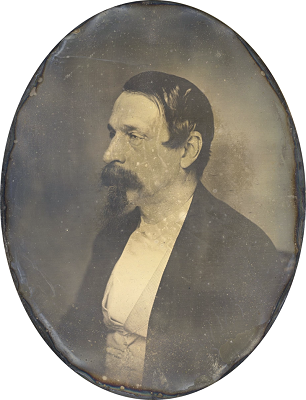
Tensions were heightened by a military adventure the previous provisional government had ordered sent to Italy, officially to protect the Pope from the war of independence that was raging between Garibaldi’s republicans and the Austrian armies. Allegedly under Louis’ orders the soldiers were told to do what was necessary to restore the Pope’s temporal control over Rome. This involved firing on Garibaldi’s army; the literal successors of the Carbonari that Louis had sworn an oath to. As a result he was regarded as a traitor by those former comrades, but it did strongly help his support among the Catholics of France.
New assembly elections were held in May of 1849, and the ongoing situation in Italy helped to polarise the electorate. The Party of Order took 400 of the 750 seats, while radical Republican leftists took 200. This left the Party of Order in control, but fully aware of their vulnerability. The radicals, on the other hand, were in the strongest position they had been in for a while. They took advantage of this to call for Louis and his government to be indicted for breaching the constitution, specifically the clause that forbade any wars of conquest. This soon led to street demonstrations, and fear of yet another revolution.
The Party of Order were quick to stoke those fears, of course, and used them to push for new laws to suppress their political enemies. Free speech was restricted, republican deputies in the Assembly were prosecuted and arrested, and martial law reigned on the streets of Paris for a while. Louis stayed out of this at first, but he could not ignore the Party of Order’s next move; one designed to ensure they stayed in power unchallenged. A new law that would nearly halve the number of Frenchmen eligible to vote, and ensure the Party of Order could stay in power forever.
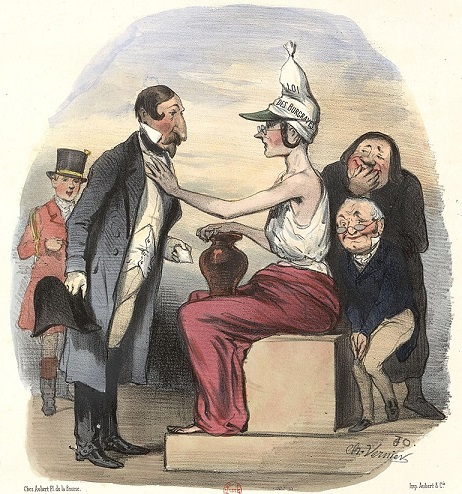
The proposed changes would mean that you could only vote if you had lived in the same district for three years, aimed at those poor who had moved to the cities in search of work since the last revolution. When they passed this law Louis was outraged. (In fact, under the new law Louis himself was ineligible to vote.) He toured the country making sure people were aware of the implications of restricting suffrage in such an arbitrary manner, and then went back to the assembly seeking to have the changes reversed. It was a close thing, but Louis was defeated by 355 votes to 348. If the dozen assemblymen arrested in the summer of 1849 had been able to vote, he would have won.
Louis now faced a crisis of his own. It was 1851, and by the constitution he would be required to step down in December of 1852 and not run for re-election. Louis was convinced that without him the Party of Order would just sink the country further into oppression. More selfishly he was sure that he was the man to save France, and he had not saved it yet. The only way he could stand for re-election was if the constitution was amended.
To do that would take a vote of two-thirds of the Assembly, and in order to manage that Louis had to make up with the Party of Order. So he dismissed his ministers and built a new team aimed at building the coalition he would need to make that change. He campaigned, he wheeled, he dealed and he did everything he had to do to build his support. By July of 1851 he thought he had that majority and held a vote on an amendment allowing him to run again. The vote was held; and the motion failed. 446 voted for it, but Louis needed 483 in order for it to pass. He had failed to win the right to re-election.
By December of 1851 Louis was facing only one more year in office. He was sure that the people supported him, and he knew that if the previous elections had been held under universal suffrage his amendment would have passed. The problem, he decided, was that the assembly did not represent the people of France. So he decided that drastic action needed to be taken. On the 2nd December 1851, the 47th anniversary of his uncle’s coronation, Louis led a military coup to overthrow the government.
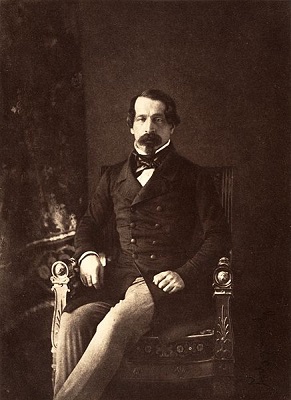
Since Louis was already the head of the government, it was a remarkably straightforward coup. His half-brother Charles (illegitimate son of Hortense and the Comte de Flahaut) enlisted the help of French Foregin Legion generals and troops from north Africa, who quietly re-entered Paris and occupied the city. When Paris woke up in the morning, the coup was effectively already accomplished. Some die-hard republicans tried to organise a rising, but this was put down with brutal efficiency (and around 300 deaths). Within a week, Louis Napoleon Bonaparte was the unchallenged dictator of France.
Louis wasted no time in purging his political opponents, arresting over 26,000 people. Ten thousand of them were exiled to Algeria, and another three thousand forced to move to new parts of France. Still, Louis felt that he needed to legitimise his coup so a referendum was called for the 20th of December. The objective was for the public to vote and affirm his right to have done what he had done. Abstention was strongly discouraged. 75% of the ten million eligible voters (with universal suffrage for men restored, of course) backed the coup.
Louis and his advisors swiftly authored a new constitution, one which gave the “Prince-President” far greater powers. His term was now ten years long, and he could serve as many as he wanted. Still, Louis was not satisfied. By October of 1852 he was giving speeches praising the idea of empire, and in November (responding to “spontaneous public outcry”) a new referendum was put to the people: should the Prince-President be made emperor? The result, in a landslide, was yes – or so they said. Though 20% of the electorate abstained, the results were claimed to be 97% in favour of making Louis Napoleon Bonaparte emperor and of bringing the Second French Republic to an end.
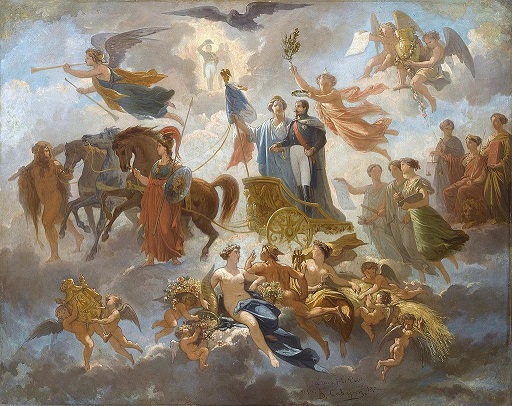
On the 2nd December 1852, one year after his coup and 48 years after his uncle’s coronation, Louis Napoleon Bonaparte was crowned Emperor Napoleon III. (The numbering was a recognition of his dead cousin, the original heir.) Of course the Emperor needed an Empress, and the eligible princesses of Europe were sent to. None were willing to tie themselves to someone still regarded by the “venerable monarchs” of Europe as an adventurer. So instead Napoleon III settled for Eugénie de Montijo, a noble Spanish beauty who he had tried (and failed) to seduce several years earlier. She had only been amenable to marriage, and now he was ready to oblige.
The emperor’s marriage was opposed by some in his court, as though Eugénie was a Countess they still felt that an emperor should only marry royalty. Naturally this led to mockery in the foreign countries who did not regard Napoleon III as a “true” royal. He was more concerned with getting a heir, which Eugénie provided him with. However she nearly died in childbirth, and that (combined with her general disgust of sex) meant that the emperor was soon returning to his mistresses to give him comfort.
Harriet Howard had been set aside when Napoleon III was married, though he had repaid all the loans she had given him with interest. They resumed their affair in the summer of 1853, though it had ended by the following year. She was replaced by Virginia Oldoini, an Italian noblewoman who had been ordered by the King of Sardinia to plead the cause of Italian independence “by any means necessary”. This she did by becoming the Emperor’s mistress, much to her husband’s annoyance. [1] It does seem to have worked though as the emperor was a supporter of the Kingdom of Italy when it was established several years later.
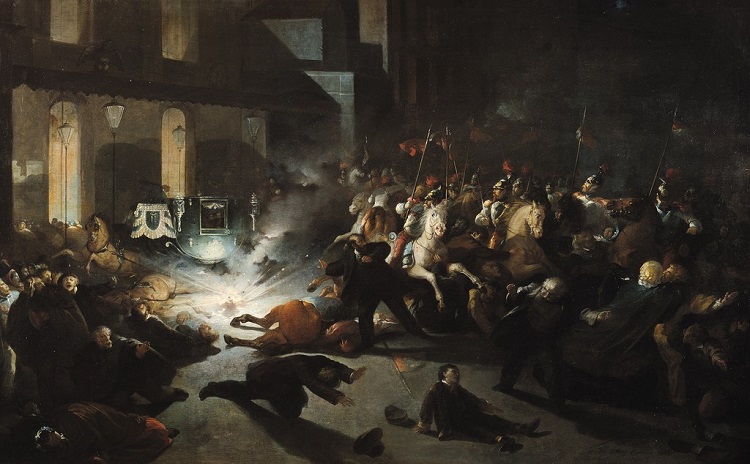
This was despite the fact that, in the meantime, he and Eugénie had narrowly escaped assassination at the hands of the Carbonari. Led by Felice Orsini, this was a revenge attack for Napoleon III’s “betrayal” of his Carbonari oaths. They also believed that a radical republican France would be an ally to them in an attempt to create an Italian Republic. To try to kill him they threw bombs at their carriage, but they failed. Orsini was executed. Charles de Rudio, another of the assassins, was sent to Devil’s Island. And the French Empire threw their military might behind Virginia’s master, the King of Sardinia.
By that time Virginia had returned to Italy, and Napoleon III had moved on to a new succession of mistresses. The most famous of these was Marguerite Bellanger, an actress who was better known for her affairs than her acting roles. She was the most universally despised of Napoleon III’s mistresses; the rich hated her for her common origins while the commoners hated her for her snobbery. Despite that (and the fact that she took other male lovers) she would remain one of the emperor’s mistresses for the rest of his reign.
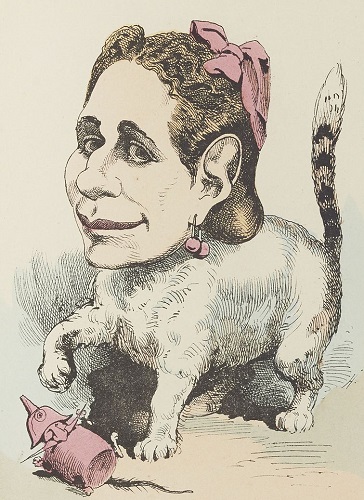
Napoleon III did do more as emperor than invade Italy and sleep around, of course. Despite having seized power he remained true to some of his early politics, and did a lot to improve worker’s rights in France. He enshrined in law the right of workers to strike and to form unions; as well as establishing a National Insurance scheme to help those left unable to work by disability. Eugénie also pushed him to support women’s rights, especially their right to an education. Education in general was also greatly reformed and updated.
The emperor also made economic reforms, most notably in reversing the protectionist stance that previous governments had taken against imports. He believed that free market economics would revitalize France, and despite internal opposition this proved to be correct. His investments in infrastructure also helped to catapult a France which had been held back by decades of political instability up into the 19th century.
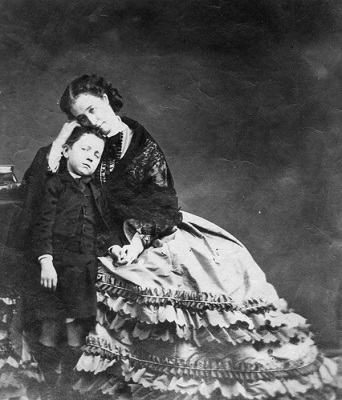
By the late 1860s, though, the emperor’s vigour had lessened. Since his years in prison decades earlier his health had never been great, and his refusal to listen to the advice of doctors made things worse. By 1869 he was unabe to ride a horse any more and needed a cane to walk. Opium, the only painkiller available, fogged his mind and left him prone to errors of judgment. One of those errors would see him walk into the trap that brought his reign as last emperor of France to an end.
Though the idea of German unification had become popular in 1848 as a vehicle for liberal reform, by the 1860s it had been commandeered by the kingdom of Prussia as a way to build itself into one of the “great powers”. Surprising most of Europe, the armies of Prussia had defeated those of the Austrian empire during a battle over the other German territories, and chancellor Otto von Bismarck had the core of his new country secured. But he knew that in order to truly unify them some great event was needed to prove the power of “Germany”. To provide that victory, he set his eyes on Napoleon’s French Empire.
Bismarck found the pretext for his war in the dispute over the Spanish throne. The Prussians had tried to position one of their princes to take over, but due to worries about putting a Protestant ruler in charge of a highly Catholic country they had been outmaneuvered and blocked by the French diplomats. In order to tie that up the French ambassador to Prussia asked the Prussian King to declare that none of his relatives would seek the Spanish throne. The Prussian King refused. It was a perfectly standard discussion, but Bismarck ensured that the version of the conversation that made it to the press was edited to make it sound like France had insulted Prussia and that Prussia had insulted France.
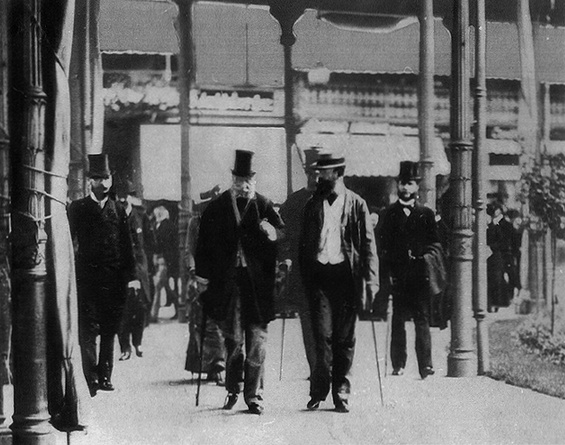
This was the match, while nationalistic fervour and old feelings of resentment between the two countries were the tinder. Soon a fire was blazing in both countries, with crowds demanding war. It was important for Bismarck’s diplomatic aims that France be the one to declare war on him. Luckily the French public and politicians had an overinflated sense of military superiority that mere facts could not stand in the way of. War was declared on the 19th of July 1870.
Napoleon III went to war with his troops, something he had done before during the invasion of Italy. Back then he had been a much younger man though, and now he was barely able to stand. He was the commander in chief, and he could not command. The French army was in urgent need of reform, and in fact those reforms were under way. But they had only just begun, leaving the army in a dangerously chaotic state. Napoleon III’s troops were poorly trained, poorly disciplined and poorly commanded – a far cry from the army which his uncle had nearly conquered Europe.
The war was a disaster for France. Their armies advanced into Germany but were soon beaten back by more disciplined Prussian troops. Eventually the French army were encircled in the town of Sedan in northern France. They made several attempts to break out of the encirclement with heavy losses, before the emperor ordered them to surrender. When news of his capture reached Paris, the government he had left behind was overthrown by a popular revolution and the Third French Republic was established. [2] Napoleon III’s dream of empire had come to an end.
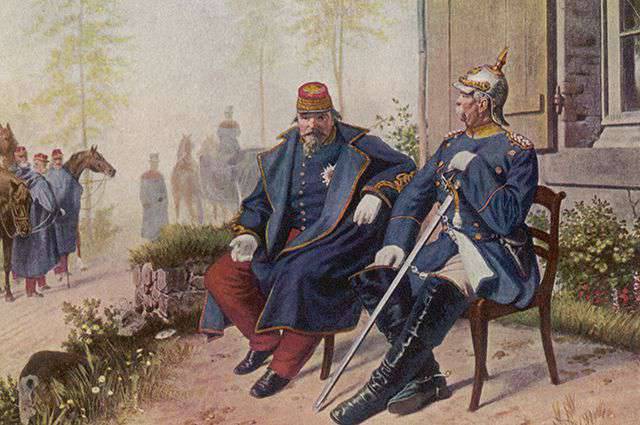
The Franco-Prussian war ground on however, largely due to the new government’s refusal to grant French territory to the newly formed German Empire. The Germans wanted the oft-disputed border territory of Alsace-Lorraine. The result, with the regular French army neutralised, was effectively guerrilla warfare on a national scale. Eventually, after a grueling siege of Paris, the Germans triumphed. In the process they had lost most of the international support that Bismarck had hoped to gain from France beginning the war, but they had established the new Germany as a military force to be reckoned with.
Napoleon III was held prisoner by the Germans until after the war, once the peace had finally been settled. Though some candidates supporting a return of the Empire stood in the first elections of the Third Republic, they were soundly defeated. The new Assembly passed a motion blaming the emperor personally for the French defeat and officially removing from power. Once that was done the Germans released him, and Louis (no longer Emperor Napoleon III) went back into exile for the final time.
The British granted the ex-emperor asylum once again, so Louis and Eugénie settled in the small town of Chislehurst just outside London. The house he lived in had been the childhood home of Emily Rowles, an English mistress of his who had helped his escape from prison so long ago. He spent his time writing letters and articles, trying to drum up support to regain his throne one last time. By now his health was in extreme decline though, and by the summer of 1872 he needed gall bladder surgery. He never really recovered from it, and died in January of 1873.
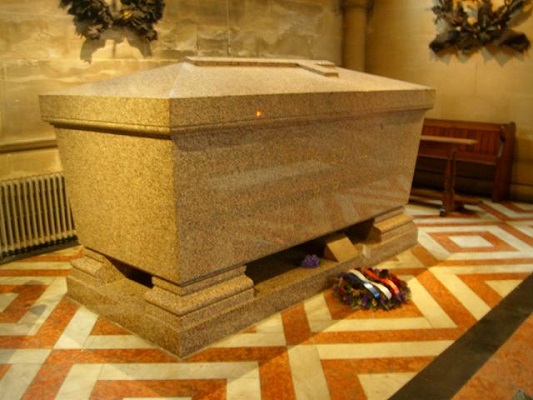
The last hope of the Bonapartist movement came to an end at the point of a Zulu spear six years later. Louis’ only legitimate child, named Louis-Napoleon, had joined the British army after the family had been exiled. When the British Empire invaded the Kingdom of Zululand in 1879, Louis-Napoleon had demanded to be allowed to see action. His mother had supported this, as had Queen Victoria herself. (There was some talk of Louis-Napoleon being married to Princess Beatrice and supported by the British in retaking the throne of France.) Though he had been given a “safe” assignment, his recklessness led him into peril and he perished. His death brought his father’s dream of Imperial France to a final end.
Images via wikimedia except where stated.
[1] Virginia is also notable as being probably the first “photographic model”, recruiting photographers and posing for over 700 photographs during her lifetime.
[2] Eugénie refused to believe that her husband had been captured at first, insisting that he must be dead because “an emperor does not surrender!” When the crowds grew violent, she and her household were forced to flee France.
